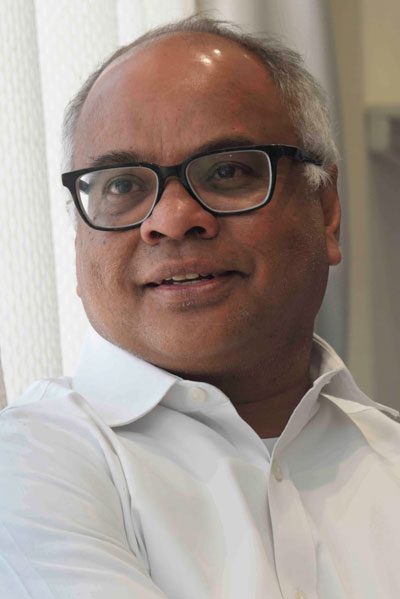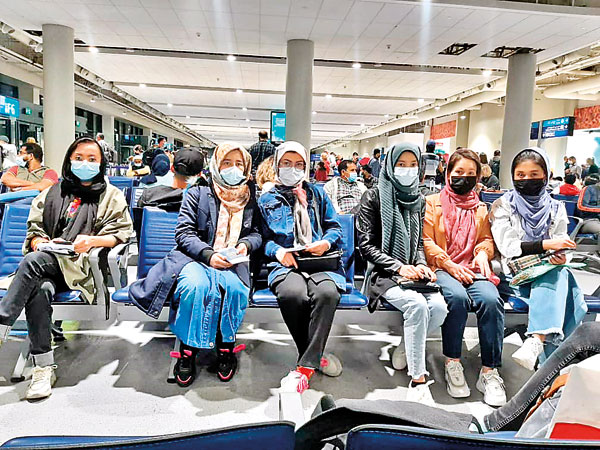The don who helped Afghan students’ flight to freedom
Just before Afghanistan – a theatre of landmines and terror, again went under Taliban rule in August 2021, Dr. Kamal Ahmad got frantic messages from his students in the beleaguered land of ancient Gandhara.
It was not COVID that was any longer the issue, but the imminent coup by the Taliban fighters. Dr. Ahmad’s Afghan students of the Asian University for Women in Chittagong, Bangladesh, were worried that soon they would not be able to leave the country to come back to their university as the Taliban would not allow education for women.
Bringing back the 150 undergraduates was itself a problem, but there were the alumni too – amounting to 80 who could not be left behind. So almost overnight, the university had to create a new Master’s programme in Education, in affiliation with American universities like Johns Hopkins and Manchester for the former graduates.

On board the US military aircraft
Getting the girls back was an epic operation. Spearheading the mission was Dr. Ahmad, founder and head of the university, who is grave as he recalls that moment of crisis when the lives of 148 girls were teetering on the edge.
In August 2021, the nearly 150 AUW students in Afghanistan, packed into seven buses, tried to enter the Kabul airport. The Taliban fighters in camouflage jackets and Kalashnikovs would not let anyone pass.
On their first day of attempts, Dr. Ahmad asked the girls over the phone to go back as there was a definite threat to their lives.
On another one of their attempts to enter the airport, while huddled in fear in their buses a suicide bomber detonated an explosive belt nearby, rocking the vehicles violently.
All the girls had downloaded a tracking app to their phones so a data specialist in the US who was working with AUW, Andrew Schroeder, could keep count of them individually.
In their final bid for freedom, the girls at last managed to get into a cavernous US military aircraft sans seats. Here they sat on the floor, knowing not where they were heading.
Meanwhile Schroeder, after all the girls had disappeared on his dashboard after the plane had taken off, found three orange dots hovering in Kabul Airport. Three girls had wandered off to charge their phones and fallen asleep, missing the flight.
The 145 girls on the military plane had been flown to Riyadh, on to Spain and finally to the USA. The other three were also flown out subsequently.
Today, 68 of these girls have happily found fully funded places at the Arizona State University while eight have been granted places at Cornell.

Dr. Kamal Ahmad. Pic by Akila Jayawardana
In Sri Lanka for a spell, Dr. Ahmad, who from age 14 has been ‘empowering the powerless’, said he was never as nervous as he awaited news of the fleeing students.
“But we won’t stop at that,” says Dr. Ahmad, as they are committed to bringing 500 more girls to AUW. This month 171 were flown over, while 330 are to arrive in the coming two months.
The Asian University for Women was the culmination of a lifetime’s compassion for the underdog. After graduating from Harvard, having worked at the World Bank, the Rockefeller Foundation, UNICEF and the Asian Development Bank, he switched to law when the prospect of staying a bureaucrat forever spooked him.
But it was as an educator (all in the genetic makeup – his grandfather and father were both university dons) that Dr. Ahmad finally found his true vocation.
The AUW was begun, in 2006, with generous support from the Bill & Melinda Gates Foundation (who gave 15 million dollars) and the Open Society Foundations.
The idea was to pick, from Asia’s less prosperous corners, deserving girls. The criteria was that they should possess courage, ‘outrage at injustice’ and empathy.
Begun with just 131 students in 2008, 25% of the graduates of AUW coming from 18 countries including Sri Lanka now go on to do PhDs in some of the world’s top universities.
While in Colombo, Dr. Ahmad met with Sri Lankan alumni who he says now hold important positions, like one who is the South Asia coordinator for a group working on guaranteeing a basic wage for the textile workers in factories.
Having had 75 Sri Lankan students at AUW so far (some of them progressing to Oxford and high rungs of diplomacy) Dr. Ahmad’s visit to Sri Lanka is tied up with plans to have up to 40 Sri Lankan students at the campus each year. A combined Sri Lankan and AUW effort for fundraising for scholarships is planned. A Sri Lanka Committee for AUW is being established to advance this goal.
Dr. Ahmad’s is a rewarding vocation indeed.
“When you see the students, as they come in their first day (and I am old enough to have seen multiple waves) you see them coming as nervous young women, their English at best limited; uncertain about what the future might hold for them…”
The product is an ‘incredibly talented’, confident young woman, “to an extent obsessed with the idea of how to make things better for other people” and that “I think is probably the best gift you can have as an educator.”

At the airport: Unsure of their destination
However, “where (they) have not been as successful” says Dr. Ahmad is when it comes to convincing the world that their efforts do come to fruition.
Classrooms and dormitories for AUW are still rented apartments and while the Bangladeshi government had given 140 acres of land, only now have the resources been eked out to start work on the first building.
There is always opposition, says Dr. Ahmad, adding his ‘biggest failure’ remains not being able to “anticipate the opposition that a very well intentioned effort seems to constantly generate”.
While Ukraine and other beleaguered parts claim the attention of the world now, he has to battle his cause in Chittagong, but his belief in the importance of ‘the human community’ above all other petty segregations, makes his work all the more impressive and heartwarming.
| Lankan students shaped by AUW’s philosophyIt was an intrinsic impulse for young Kamal to liberate those denied equal rights to education and self-advancement. Living in Dhaka aged 14, he mustered the domestics’ children in the university community, and had evening classes in garages and under trees.His impassioned letter (written in Grade Seven) to the Australian High Commissioner in Bangladesh when the aborigine Albert Namatjira was arrested for buying liquor in Australia triggered a 15 page response from the HC. His anti-apartheid stirrings while a teenager at the Phillips Exeter Academy, USA, disturbing for the school’s authorities, taught him “the power of the powerless”: how moral courage can make the powerless ‘shake things up’ and make the seemingly invincible faction, vulnerable. Fostered in this tradition his Sri Lankan students at AUW have done him proud. Says Kanchana Arachchi, career consultant and gender advocate, “Have you heard about the ‘Phenomenal woman’ Maya Angelou talks about in her poem? That’s who AUW creates, a woman who is well educated, who embraces her womanliness, who encourages other women, who sets her own standards, who takes care of her families, and prioritizes responsibilities, who wears her confidence and who is sensitive to social injustice, inequality and discriminations. Yes, it’s not just a degree you get, once you go there, you become a part of the best supportive system where you can earn internships, scholarships, exchange programmes, and above all a family.” Adds another alumna Aberamy Sivaloganathan, “My advantage as a woman and a human being was unplugged by AUW. The quality and the nature of the education that I have received empowered me to be who I am today: a proud woman, daughter, mother and successful achiever in my career.” Kalhari Gunarathna, herself an educator now at Lyceum International School Wattala says, “AUW offers not only education but so many other opportunities to empower young women such as foreign internships and study abroad or exchange programmes. “AUW has had a great influence on me in terms of my profession because AUW completely changed my ideology of the teaching-learning process. At AUW, students were heard, respected, and valued so that a secure feeling is built in the students to speak, share, and acquire knowledge.” | |
Searching for an ideal partner? Find your soul mate on Hitad.lk, Sri Lanka's favourite marriage proposals page. With Hitad.lk matrimonial advertisements you have access to thousands of ads from potential suitors who are looking for someone just like you.


